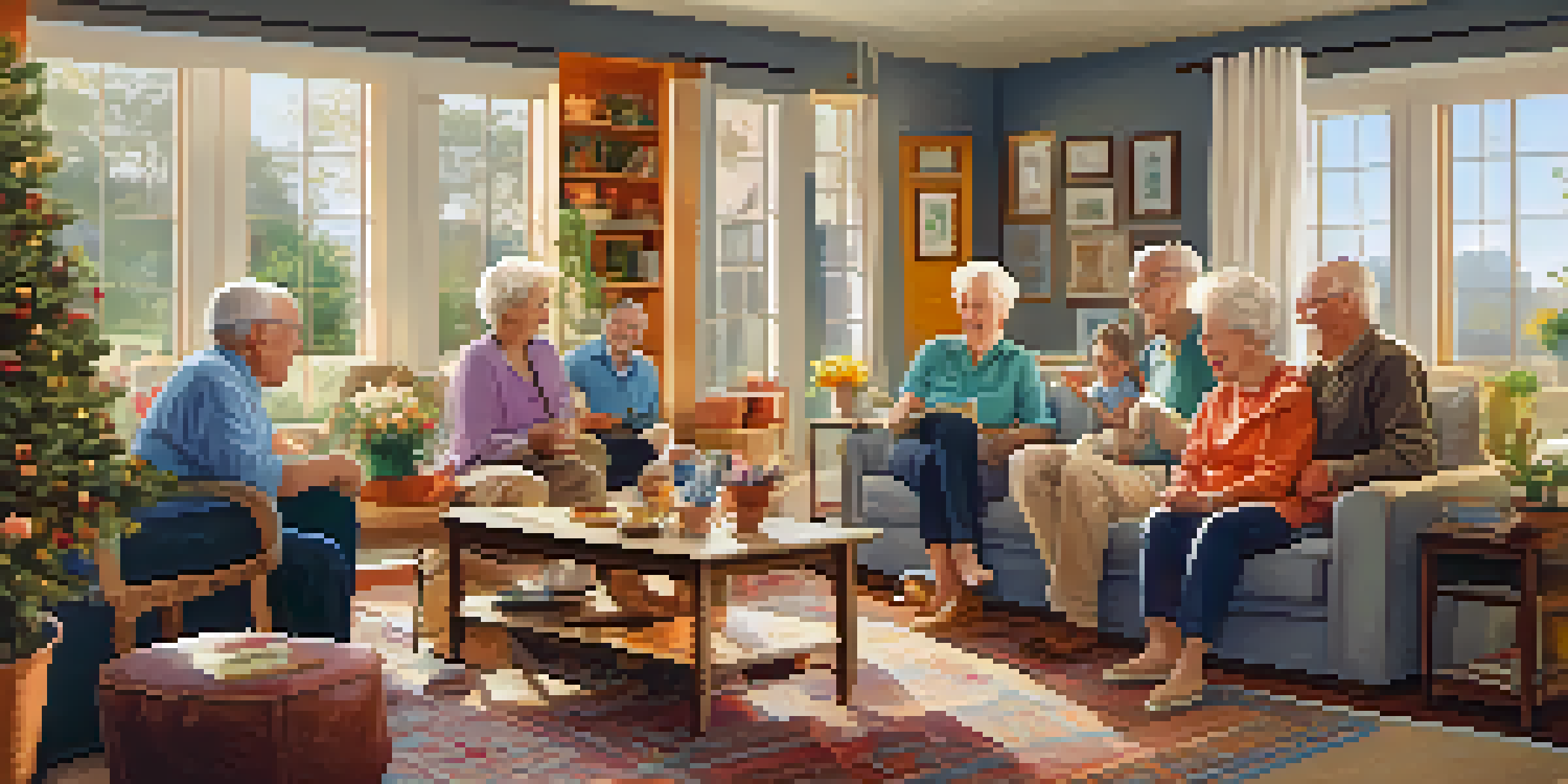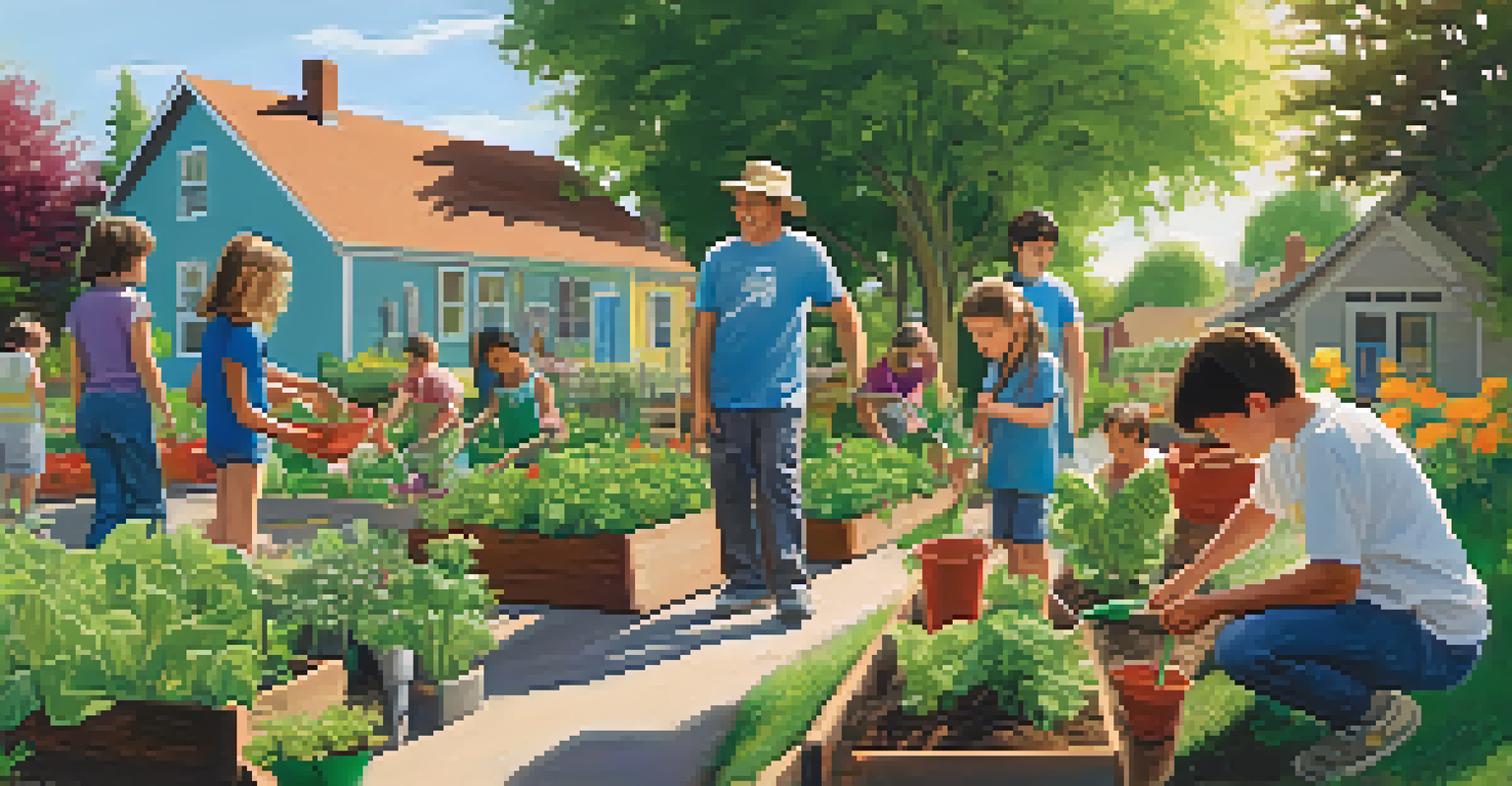The Benefits of Community Support in Multi-Generational Living

Understanding Multi-Generational Living Dynamics
Multi-generational living refers to families where multiple generations reside together, such as grandparents, parents, and children. This arrangement can offer a supportive and nurturing environment for everyone involved. By sharing a home, families can create a stronger bond and foster a sense of unity between different age groups.
The greatness of a community is most accurately measured by the compassionate actions of its members.
However, living under one roof can also present unique challenges, like differing lifestyles and values. This is where community support becomes crucial—helping families navigate these dynamics. By leveraging community resources, families can find solutions that accommodate everyone's needs while enhancing their living experience.
Ultimately, understanding the dynamics of multi-generational living lays the foundation for more effective community engagement. By embracing this lifestyle, families can build a network of support that benefits everyone involved.
Strengthening Family Bonds Through Shared Experiences
One of the most significant benefits of community support in multi-generational living is the opportunity to strengthen family bonds. When family members collaborate on daily activities, such as cooking or childcare, they create lasting memories together. These shared experiences not only enrich relationships but also build a sense of belonging within the family unit.

Moreover, engaging with community programs allows families to connect with others who share similar values. This creates an extended support network where families can lean on one another for advice or assistance. The result is a richer, more fulfilling family life that extends beyond the immediate household.
Strengthening Family Connections
Engaging in shared activities fosters deeper bonds among family members, enhancing unity and belonging.
In this way, community support acts as a catalyst for deeper connections among family members. By participating together in local events or initiatives, families can bond over common interests and experiences, leading to more cohesive relationships.
Creating a Supportive Environment for All Ages
Community support fosters an environment where individuals of all ages feel valued and included. In multi-generational living, this is especially important as each generation brings unique perspectives and skills to the table. When families tap into local resources, they can create spaces that cater to everyone's needs, from toddlers to seniors.
Family is not an important thing. It's everything.
For instance, community centers often offer programs designed for various age groups, such as workshops or recreational activities. These programs not only promote intergenerational interaction but also encourage learning and growth. By participating in these activities, family members can learn from one another, enriching their lives in the process.
Thus, a supportive community enhances the quality of life for all family members. By embracing diversity and fostering inclusivity, families can create a nurturing environment that celebrates the strengths of each generation.
Promoting Mental Health and Well-Being
Living in a multi-generational household can sometimes lead to feelings of isolation, especially for older adults. Community support plays a vital role in promoting mental health and well-being by connecting individuals to social networks. By encouraging participation in local events or volunteer opportunities, families can help combat loneliness and create a sense of purpose.
Engaging with the community also provides mental stimulation through social interactions and shared activities. This is particularly beneficial for older adults, who may thrive on companionship and engagement. When families actively seek out community connections, they can foster an environment that prioritizes mental health for everyone.
Community Support Enhances Well-Being
Participating in community programs promotes mental health and combats isolation for all ages.
Ultimately, prioritizing mental well-being through community support not only benefits individuals but also strengthens family dynamics. A happy, healthy family unit is one that supports each member's mental health needs.
Financial Benefits of Community Support
Another advantage of community support in multi-generational living is the potential for financial savings. When families pool resources, they can share expenses related to housing, utilities, and food. This collaborative approach can alleviate financial burdens, allowing families to invest in experiences rather than just survival.
Additionally, community programs often provide access to free or discounted services, such as childcare or educational workshops. These resources can significantly reduce costs for families, making it easier to provide for everyone’s needs. By exploring these options, families can create a more sustainable living situation.
In this way, community support not only strengthens family ties but also promotes financial stability. When families work together and support one another, they can thrive economically while enjoying the benefits of shared living.
Fostering Lifelong Learning Opportunities
Multi-generational living encourages lifelong learning, which is further enhanced by community support. Families can take advantage of local educational programs that cater to all ages, creating an environment where curiosity and growth are prioritized. From art classes to technology workshops, the opportunities for learning are endless.
When family members participate in these programs together, they not only learn new skills but also foster deeper connections. This shared journey of discovery can be incredibly rewarding, as family members support one another in their learning endeavors. Ultimately, this creates a culture of curiosity and growth that benefits everyone.
Financial Savings Through Collaboration
Pooling resources in multi-generational households can significantly reduce living expenses and enhance financial stability.
By embracing community support, families can cultivate an environment where lifelong learning is celebrated. This commitment to education can lead to personal and collective growth, enriching the lives of all family members.
Building Stronger Neighborhood Relationships
Community support in multi-generational living extends beyond the family unit, fostering stronger neighborhood relationships. When families engage with their local community, they create connections with neighbors who may also be living in similar arrangements. These relationships can lead to a robust support network that enhances the living experience for everyone involved.
By participating in neighborhood events or initiatives, families can build rapport and trust with their neighbors. This sense of community not only improves safety but also encourages collaboration in problem-solving and resource sharing. The result is a more cohesive neighborhood where everyone looks out for one another.

Ultimately, building strong neighborhood relationships through community support contributes to a sense of security and belonging. When families feel connected to their surroundings, they can thrive in their multi-generational living arrangements.
Embracing Diversity and Cultural Exchange
Multi-generational living often brings together individuals from various backgrounds, creating rich cultural exchanges. Community support can facilitate these interactions, allowing families to learn from one another’s traditions and values. This diversity not only broadens perspectives but also fosters empathy and understanding among family members.
Participating in cultural events or sharing family traditions can help create a sense of unity within the household. When family members embrace each other's backgrounds, they can weave a tapestry of experiences that enrich their lives. This cultural exchange can also strengthen community ties, as families engage with others who share diverse backgrounds.
In summary, embracing diversity through community support enhances the multi-generational living experience. By learning from one another and celebrating differences, families can create a harmonious environment that values every individual.